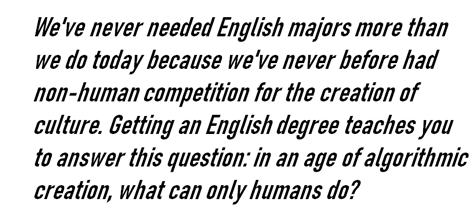The start of the English major
In the A.I. revolution, figuring out the contours of our human intelligence has never been more important. Who is best equipped to do this work?
By Brad Berens
I give keynote addresses all over the planet about digital transformation and sharpest-edged technology trends. One of my themes is that anything that can be digital will be digital. The counterintuitive corollary to this is that the value of what you’re up to will come from the bits that can’t be digitized—the leftovers.
 This is like grade school division: you learn that eight goes into 60 only so many times (seven), and you’ve got four left over. That’s the remainder. When you get to junior high and learn about decimals, the leftovers acquire an illusion of tidiness: instead of 60÷8=7 r4 you get 60÷8=7.5. This disappears the remainder, but remainders are important because what doesn’t fit into tidy equations is what we call culture.
This is like grade school division: you learn that eight goes into 60 only so many times (seven), and you’ve got four left over. That’s the remainder. When you get to junior high and learn about decimals, the leftovers acquire an illusion of tidiness: instead of 60÷8=7 r4 you get 60÷8=7.5. This disappears the remainder, but remainders are important because what doesn’t fit into tidy equations is what we call culture.
The quantification of life started with the Industrial Revolution, sped up with the Digital Revolution, and now the next revolution, Artificial Intelligence, is hitting the gas — whoops! I meant to say, “the acceleration pedal on the EV.”
Sure, more people are making more culture more of the time than ever before, but the experience of that culture takes up less geography in our lives. We get most of it on the six inch by three inch piece of glass in our hands. Algorithms decide what we see, and as I’ve written previously those algorithms are increasingly able to create things that look like culture.
Figuring out the remainder—what can’t be digitized, what only humans can do in an age of evermore powerful A.I.—is the project of the humanities.
That’s why I’m frustrated by Nathan Heller’s recent New Yorker piece, “The End of the English Major.” I mentioned this article in a previous column, accusing it of editorial malpractice because at more than 10,000 words it’s a ponderous mess that focuses on Harvard and Arizona State University and ignores the nearly 4,000 other schools in the U.S.
Let me save you some time. In the 1980s when I said I was majoring in English Lit, Lauren (older than me, daughter of family friends, never an unshared opinion) quipped, “an English degree? You gonna be the pinsetter at a bowling alley with an English degree?” Heller’s story is an old and stale one. Parents of English majors have always worried that there’s no direct line between getting that degree and a job.
But humanities degrees aren’t about direct lines. Neither is life. Plenty of English majors have exciting careers in disparate fields because getting a degree in the humanities equips you to dig into vexing questions like, “What is this thing about? What’s good about it? What’s bad? And what is it leaving out?” Those questions are important for any organization trying to get ahead. They’re also hard to quantify, which means that they’re hard for A.I.s to answer.
For example, I just fired up Bing (powered by ChatGPT) and asked, “what is Hamlet about?” It replied with a plot summary, which is accurate but superficial. Hamlet has a plot, but the story is about grief, indecision, love, revenge, and whether there’s something waiting for us after death. A plot summary doesn’t capture any of that.
Frankly, humans can’t answer these questions either, at least not in any definitive way, because the things we’re asking questions about exist in time, so what they mean changes as times change. Shakespeare’s The Merchant of Venice means different things to audiences after the Nazi genocide in WWII. Twain’s Huckleberry Finn means different things to readers after Civil Rights, Black Lives Matter, and who does and doesn’t get to say the N word. Human answers are “good enough for now but ask me again later.”
We’ve never needed English majors more than we do today because we’ve never before had non-human competition for the creation of culture. Getting an English degree teaches you to answer this question: in an age of algorithmic creation, what can only humans do?
Heller is right that English departments are in an identity crisis facing declining enrollments and an unclear mission, but he’s wrong that this crisis signals the end of the English Major. It’s not the end, but it is a reboot. English Departments around the country face intense, uncomfortable, productive evolutionary pressure. What comes after will be different.
The old, antiquated English department missions—starting with Matthew Arnold’s “the best that has been thought and said”—must give way to equipping English majors for thoughtful exploration of what remains for humans after algorithms have finished chewing on numbers, the leftovers, the remainder, culture.*
This is the start of the English major.
__________

Brad Berens is the Center’s strategic advisor and a senior research fellow. He is principal at Big Digital Idea Consulting. You can learn more about Brad at www.bradberens.com, follow him on Post and/or LinkedIn, and subscribe to his weekly newsletter (only some of his columns are syndicated here).
* I have adapted “the remainder… is what we call culture,” from the brilliant but hair-tearingly impenetrable book The Practice of Everyday Life by Michel de Certeau.
See all columns from the Center.
March 15, 2023

